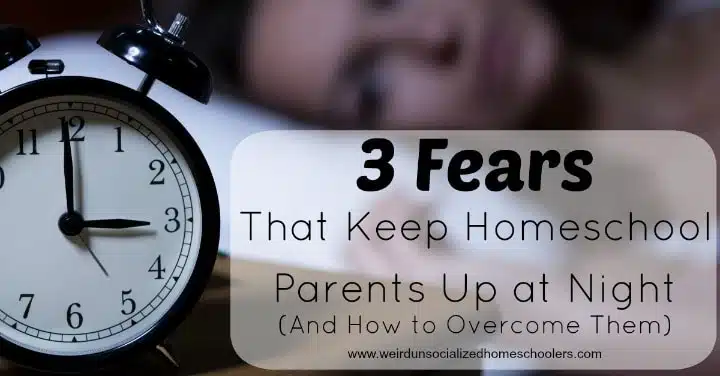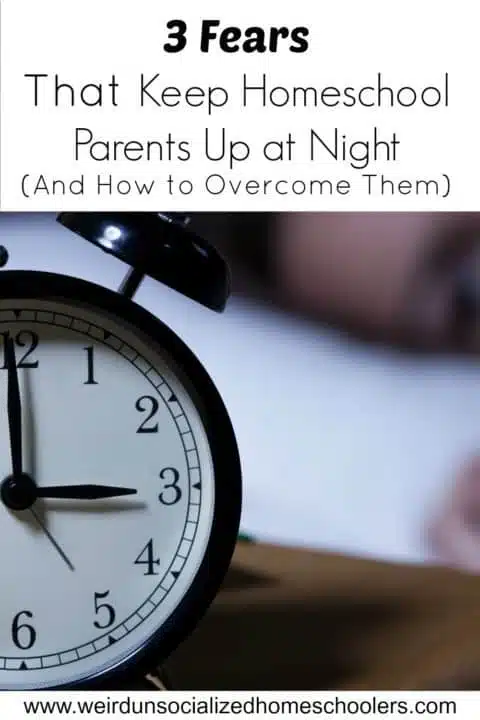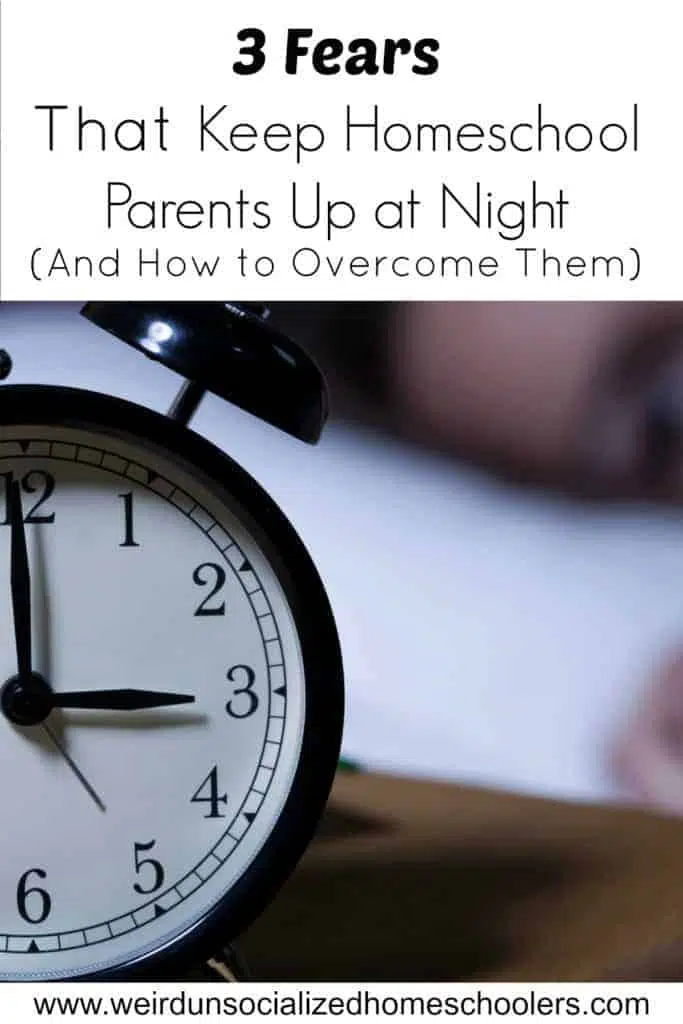3 Fears That Keep Homeschool Parents Up at Night (And How to Overcome Them)
Nighttime, when the house is quiet (mostly – I am a mom to teens) and I’m lying in bed try to sleep, I like to worry. Okay, I don’t like to worry, but that’s when my mind starts to wander. And it always wants to wander into “worst case scenario” land.
Maybe it’s just me – but I doubt it. I imagine that the three fears I’ve identified are common among homeschooling parents. Can you relate to them?

1. We’re not doing enough.
Most homeschooling parents have experienced this fear at one time or another. When you worry that you’re not doing enough, use some of the following as a general guide.
Homeschool curriculum. If you’re using grade leveled curriculum and you’re progressing through it at a steady pace, you’re likely covering the basic age-appropriate topics. Don’t fall into the trap of feeling like you have to complete every single page, unit, or chapter. Even kids in a traditional school setting often don’t finish entire books. Curriculum publishers usually provide enough material for a 36-week school year, which likely doesn’t take into account activities such as field trips or co-op classes.
A typical course of study. If you’re piecing together your own curriculum, you may want to consult a typical course of study as a guide for what to cover. Don’t feel that you have to cover it all. Use it as reassurance that you’re already covering the suggested topics or a resource for brainstorming.
State laws. Some states require that you cover specific subjects in your homeschool. For example, Georgia requires that homeschooling parents include language arts, reading, science, social studies, and math. If your state has similar laws, use them as a guide for covering the basics.
Your child’s progress. If you see steady improvement in your student’s understanding of the subjects and concepts you’re teaching, you’re likely doing enough.
Standardized testing. I offer this suggestion cautiously because some kids just don’t test well. As long as you’re looking for steady progress, not stellar scores, standardized tests can be helpful. They can also pinpoint areas that you may have missed, giving you insight into what to include in next year’s lessons.
If, after evaluating the situation, you decide that you’re really not doing enough, you can make course corrections with no lingering damage. Yes, I know this from personal experience.
2. I’m not going to teach something important.
I think we all worry that we’re going to overlook something major that our kids need to know. I once heard a speaker at a homeschool convention say something to the effect of, “You can’t teach everything. Everything is the universe. You can’t teach the universe in twelve years, so get over it.”
Or something like that.
The point is, there will be gaps in your child’s education – no matter where she goes to school. The best way to overcome this fear is to teach your children two things. Teach them how to learn and that learning never stops.
Recently, I was trying to manipulate a spreadsheet to do something that I wasn’t even sure was possible. After searching online, asking some people, watching a YouTube video, and trial and error, I figured it out. I didn’t sit around thinking, “Oh, no! I didn’t learn this in school. Now, there’s no way for me to figure it out.”
I’m exceedingly glad that’s not true because you know what? I’m old, and Windows wasn’t even a thing when I was in school, much less Excel.

My younger kids never learned cursive. Without debating over the importance of teaching cursive, I’ll just say that teaching it was a battle I didn’t care to fight in elementary school
Now that they’re both teens and need to sign things like driver’s licenses and job applications, they want to learn cursive. So, I bought workbooks, and they’re learning. The world didn’t end because they didn’t learn it in elementary school.
If you discover something important that you missed, you can add it to your homeschool lessons at any time. You might also consider:
- Hiring a tutor
- Signing your student up for classes online or at a community college
- Checking for opportunities in the community
- Focused attention during summer break
3. What if this is all a huge mistake?
I’m sure there are confident homeschooling parents out there who never have this fear. I’m not one of them. However, I know that I would have the same fear if we had chosen to send our kids to public school.
Worrying about the choices we make is a part of parenting – part of human nature in general. We always wonder about the road not taken.
These thoughts usually enter my mind accompanied by worry over some other aspect of homeschooling. To overcome this fear, I try to take an objective look at the pros and cons of homeschooling. It helps me see that while there might have been pros for a different educational route, those for homeschooling far outweigh the cons.
When I think of the emotional impact a public school setting would have had on my severely dyslexic boy (because we got a taste of that with my mildly dyslexic girl before we decided to homeschool) and my ADD girl, I know that homeschooling was a better option for their emotional well-being.
I think about the time the kids have had to invest in their interests, the friends they’ve made, and the time we’ve been able to spend together as a family, and I know homeschooling was the right choice for us.
Sometimes during these times of introspection, I do identify areas that need some course correction, and that’s okay. Identifying weaknesses doesn’t mean that the decision to homeschool was a huge mistake overall. It just spotlights an area with room for improvement. That happens in life, regardless of where kids attend school.
Have you experienced these fears as a homeschooling parent? How did you overcome them? What other fears have you battled?
This post is linked to the Hip Homeschool Hop.
Kris Bales is a newly-retired homeschool mom and the quirky, Christ-following, painfully honest founder (and former owner) of Weird, Unsocialized Homeschoolers. She has a pretty serious addiction to sweet tea and Words with Friends. Kris and her husband of over 30 years are parents to three amazing homeschool grads. They share their home with three dogs, two cats, a ball python, a bearded dragon, and seven birds.




Love your blog!
I really needed to read this! Thank you, Kris! I need to “get over” not teaching everything! This is one area, I can stop spending sleepless nights worrying.
Iwe are new in homeschooling. My boy started 8th grade. We live in Mexico, he has ADD, so he had trouble focusing in school that’s what made us take a step up and try this. He is doing great, he has confidence and doing everything all by himself, which before he was always asking for help because the pressure of regular teachers and school was really hard on him, his self esteem was really bad, now he is happy and responsible, my only concern is how good high schools and collage take kids that had been homeschooled. Is it easy to go back to regular school? and are they prepare enoug to go ahead in the regular curriculum?? Sorry if my English is not that good im Mexican, but I try my best,
I don’t have any experience with putting kids back in public school since we homeschool through high school. However, I shared these tips from friends of mine who’ve done it: Help! What if My Homeschooler Needs to Go to Public School? Hopefully that will help.